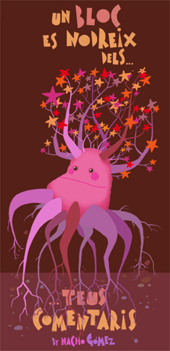
Vet aquí el tercer poema de la sèrie An Unwritten Poem, d'Auden.
III
Però aquest poema que ara m’agradaria escriure no bastaria que fos bo i genuí: si m’ha de plaure, també ha de ser vertader.
Llegeixo un poema d’algú altre en què vessa llàgrimes quan pren comiat de l’estimada: el poema és bo (em commou igual que altres poemes bons) i genuí (hi reconec la «mà» del poeta). Després, en una biografia, reparo que, llavors que el va escriure, el poeta estava tip i cuit de la seva xicota però va fingir que plorava per tal de no ferir-la i estalviar-se una escena. Aquesta dada, ¿modifica la valoració que faig del poema? De cap manera. No he tractat mai l’autor i no n’he de fer res, de la seva vida privada. ¿La meva valoració seria una altra si el poema l’hagués escrit jo? Vull pensar que sí.
Però aquest poema que ara m’agradaria escriure no bastaria que fos bo i genuí: si m’ha de plaure, també ha de ser vertader.
Llegeixo un poema d’algú altre en què vessa llàgrimes quan pren comiat de l’estimada: el poema és bo (em commou igual que altres poemes bons) i genuí (hi reconec la «mà» del poeta). Després, en una biografia, reparo que, llavors que el va escriure, el poeta estava tip i cuit de la seva xicota però va fingir que plorava per tal de no ferir-la i estalviar-se una escena. Aquesta dada, ¿modifica la valoració que faig del poema? De cap manera. No he tractat mai l’autor i no n’he de fer res, de la seva vida privada. ¿La meva valoració seria una altra si el poema l’hagués escrit jo? Vull pensar que sí.
(Traducció: jo mateix)
But this poem which I should now like to write would not only have to be good and genuine: if it is to satisfy me, it must also be true.
I read a poem by someone else in which he bids a tearful farewell to his beloved: the poem is good (it moves me as other good poems do) and genuine (I recognize the poet’s «handwriting»). Then I learn from a biography that, at the time he wrote it, the poet was sick to death of the girl but pretended to weep in order to avoid hurt feelings and a scene. Does this information affect my appreciation o this poem? Not in the last. I never knew him personally and his private life is no business of mine. Would it affect my appreciation if I had written the poem myself? I hope so.
But this poem which I should now like to write would not only have to be good and genuine: if it is to satisfy me, it must also be true.
I read a poem by someone else in which he bids a tearful farewell to his beloved: the poem is good (it moves me as other good poems do) and genuine (I recognize the poet’s «handwriting»). Then I learn from a biography that, at the time he wrote it, the poet was sick to death of the girl but pretended to weep in order to avoid hurt feelings and a scene. Does this information affect my appreciation o this poem? Not in the last. I never knew him personally and his private life is no business of mine. Would it affect my appreciation if I had written the poem myself? I hope so.


















Cap comentari:
Publica un comentari a l'entrada